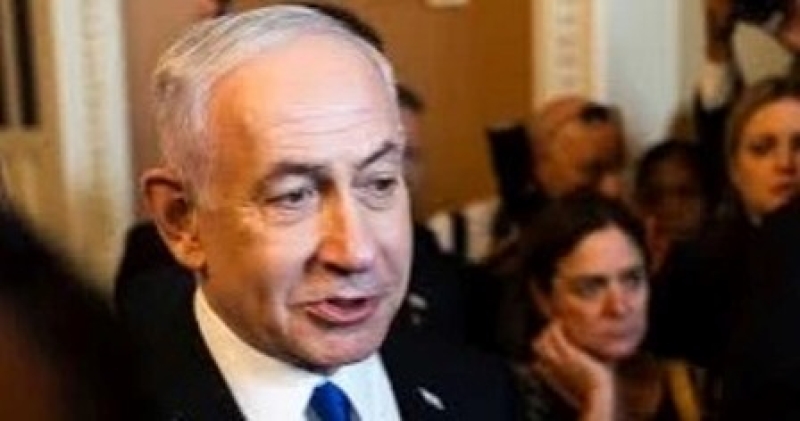- India Sees 9% Drop in Foreign Tourists as Bangladesh Visits Plunge |
- Dhaka Urges Restraint in Pakistan-Afghan War |
- Guterres Urges Action on Safe Migration Pact |
- OpenAI Raises $110B in Amazon-Led Funding |
- Puppet show enchants Children as Boi Mela comes alive on day 2 |
Israel weighs alternatives to ceasefire talks with Hamas

Benjamikn Netanyahu, Prime Minister of Israel. AP.
Israeli Prime Minister Benjamin Netanyahu announced Friday that his government is exploring "alternative options" to the ongoing ceasefire discussions with Hamas. This comes after both Israel and the U.S. withdrew their negotiation teams, increasing doubts about the talks’ future.
Netanyahu’s comments followed statements by a Hamas official who claimed talks would resume next week, suggesting that the delegations’ withdrawal was merely a tactic to increase pressure. Egypt and Qatar, the main mediators along with the U.S., also stated the pause was temporary but gave no date for when discussions would continue.
On Thursday, the delegations exited Qatar as U.S. envoy Steve Witkoff criticized Hamas' latest response as lacking genuine commitment to a truce. He indicated the U.S. was also reviewing "alternative options," without specifying details.
Echoing Witkoff’s remarks, Netanyahu accused Hamas of blocking a hostage deal and stated, “Together with our American partners, we’re considering alternative strategies to bring the hostages home, end Hamas’s rule of terror, and secure lasting peace for Israel and the region.” The Israeli government has not confirmed if talks will resume next week.
Humanitarian Crisis Deepens as Talks Stall
Efforts to reach a ceasefire between Israel and Hamas remain stalled, as conditions in Gaza continue to deteriorate. Experts warn the region is nearing famine after Israel’s months-long blockade, allowing only limited food supplies. Reports this month show a surge in deaths linked to malnutrition.
Over two dozen Western-aligned nations and more than 100 humanitarian organizations have demanded an end to the conflict, criticizing Israel's blockade and a new system for aid delivery. Some groups say their own workers are struggling to access enough food.
French President Emmanuel Macron said Thursday that France will recognize Palestine as a state, urging an immediate halt to the conflict to save civilian lives. Meanwhile, Jordan has sought permission to air-drop essential supplies into Gaza, including food and baby formula. Israeli and Jordanian officials said the Israeli military is coordinating the planned drops, which are expected soon.
In Gaza City, desperate residents queued at a charity kitchen for watery lentil soup—one of the few remaining sources of food. The number of meals provided by such kitchens has dropped drastically from over a million daily in April to just 160,000, according to the U.N.
“We haven’t had bread in three months,” said Riham Dwas, a woman waiting in line. “We survive on lentils from the charity kitchens, and sometimes we don’t even have that.” When there’s no food, she takes her children to the hospital for IV drips.
Airstrike Kills Civilians at Shelter School
An Israeli airstrike hit a school-turned-shelter in Gaza City on Friday, killing at least five people, including an 11-year-old boy, hospital officials reported. Mourners later carried the victims’ bodies from Shifa Hospital as grieving women cried and shouted.
Taraji Adwan, who lost both her son and grandson in the attack, screamed in anguish, “Enough! End this war! Our children are dying from hunger, strikes, fear, and destruction. Enough, Hamas! Enough, Israel! Enough, world!”
The Gaza Health Ministry stated that about 80 people have been killed since Thursday night, mostly in airstrikes, with nine deaths occurring during aid distribution.
Core Disagreements Continue to Stall Talks
Hamas official Bassem Naim said the Israeli team had left for consultations and was expected back next week to continue negotiations. He claimed progress had been made, noting that many issues—such as the sequencing of a ceasefire and humanitarian aid delivery—were nearly resolved.
Egypt and Qatar also released a joint statement acknowledging progress and noting that it was common to pause negotiations for consultations.
Despite weeks of talks in Qatar, breakthroughs have been elusive. A key point of contention is whether Israeli forces will withdraw from Gaza after a truce is reached.
The proposed agreement includes a 60-day ceasefire, during which Hamas would release 10 hostages alive and return the bodies of 18 others in stages. In exchange, Israel would release Palestinian prisoners and allow more aid into Gaza. Discussions on a permanent truce would follow.
However, deep divisions remain: Hamas insists it will only release all hostages if Israel agrees to end the war and withdraw fully. Israel, in turn, demands that Hamas relinquish power and disarm—something Hamas refuses, though it has said it is willing to give up governance.
Hamas is believed to be holding the remaining hostages in scattered locations, including tunnels. The group has reportedly ordered their guards to kill the hostages if Israeli forces attempt a rescue.
Roughly 50 hostages remain in Gaza, though fewer than half are believed to be alive. Their families are growing increasingly frustrated with the lack of progress.
“I had hope when I heard the Israeli negotiation team went to Doha,” said Yehuda Cohen, whose son Nimrod is among the hostages. “But now they’re back. I just wonder—when will this nightmare finally end?” - UNB

